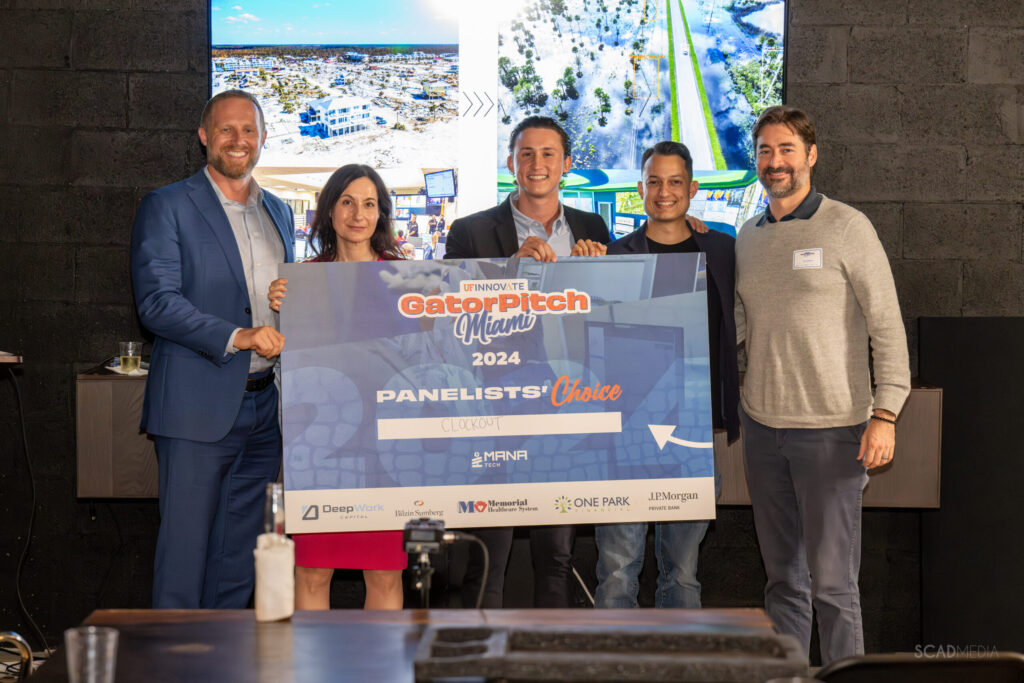LightPath Technologies Introduces New Optical Gas Imaging Camera for Ammonia and SF6 Detection
UF startup LightPath Technologies announced a new version of its Optical Gas Imaging (“OGI”) camera platform to detect fugitive ammonia and sulfur hexafluoride (SF6) emissions for industrial and manufacturing applications.
Source Agriculture Corp. Makes Strategic Investment in Ascribe Bioscience To Advance Sustainable Crop Protection Solutions
Source Agriculture Corp., an innovative agri-tech investment firm, announced a strategic investment in UF Startup Ascribe Bioscience, a cutting-edge company dedicated to developing sustainable crop protection solutions.
Cannabix Technologies Receives Positive Testing Certification for Breath Logix Autonomous Alcohol Breathalyzer
UF Startup Cannabix Technologies Inc. reports that it has received a positive certification test report from the globally recognized laboratory CEcert GmbH, based in Germany, for its Breath Logix autonomous, wall-mounted alcohol breathalyzer device.
RTI Surgical Announces First Patient Enrolled in Investigational Device Exemption (IDE) for Cortiva® Allograft Dermis in Breast Reconstruction
UF Startup RTI Surgical announced the enrollment of the first patient in ADMIRE, a study designed to confirm the safety and effectiveness of Cortiva® Allograft Dermis in implant-based breast reconstruction.
Novartis Buys Kate Therapeutics, Eyeing $55B CGT Market Opportunity by 2030
UF Startup Kate Therapeutics, a gene therapy specialist, is being acquired by Novartis in a deal worth up to $1.1 billion. This acquisition aligns with Novartis’s efforts to deliver treatments for neuromuscular disorders and fits into the pharma’s strategy to expand its new modality pipeline, ensuring long-term business sustainability.
GatorPitch Showcases University of Florida Startups in Miami

UF Innovate hosted its inaugural GatorPitch event on Thursday, November 7, at Miami’s Mana Tech, showcasing six of the University of Florida’s best startups to more than 150 attendees from South Florida’s dynamic investor and entrepreneurial community.
Solid Biosciences To Present at the Jefferies London Healthcare Conference
Solid Biosciences Inc., a biotechnology company that acquired UF startup AavantiBio, announced that Bo Combo, President and CEO, and Gabriel Brooks, M.D., Chief Medical Officer, will present at the Jefferies London Healthcare Conference on November 20.
Kriya Announces Publication of Preclinical Data for Its Investigational AAV-FGF21 Gene Therapy Demonstrating Durable Reversal of Liver Fibrosis
UF Startup Kriya Therapeutics, a biopharmaceutical company developing gene therapies to address common diseases affecting millions of people around the world, announced the publication of preclinical data for its investigational AAV-FGF21 gene therapy.
Atsena Therapeutics and Nippon Shinyaku Enter Exclusive License Agreement for ATSN-101
Atsena Therapeutics Inc., a UF Startup, has entered into an exclusive license agreement with Nippon Shinyaku Co., Ltd. for the commercialization of ATSN-101 in the United States, and for its development and commercialization in Japan.
NovaBone Secures FDA Clearance for Expanded Indications of Putty in Interbody Fusion Applications
UF Startup NovaBone Products announced that it has received FDA clearance for its bioactive synthetic bone graft, NovaBone Putty, which is now expandable for use in the intervertebral disc space.
